Melissa Buckley, Fort Leonard Wood Public Affairs Office
FORT LEONARD WOOD, Mo. (Sept. 29, 2025) — Soldiers with the military occupational specialty of 74D Chemical, Biological, Radiological and Nuclear Specialist begin their Army careers at Fort Leonard Wood during advanced individual training with the 3rd Chemical Brigade.
According to goarmy.com, CBRN specialists protect the country against the threat of CBRN weapons of mass destruction and decontaminate hazardous material spills or accidents. They also coordinate defense systems against these weapons of mass destruction in support of joint and combined arms operations.
Staff Sgt. Zackery Thompson, a U.S. Army CBRN School instructor, said when Soldiers graduate from the nine-week AIT they will, “be experts in all Level 10 Chemical, Biological, Radiological, and Nuclear tasks and be ready to advise commanders on CBRN threats on the battlefield.”
According to the U.S. Army CBRN School’s website, the 74D AIT covers detection, monitoring, identification, sampling, decontamination equipment operations and reconnaissance fundamentals. It also covers tactics, techniques and procedures for performing traditional CBRN defense operations at the company level and hazardous materials response operations at the HAZMAT awareness and operation levels with a mission specific competency covering personal protective equipment and mass decontamination operations.
Thompson said decontamination operations are his favorite skills to teach, “due to how important it is for us as CBRN Soldiers.”
“We teach the Soldiers how to decon themselves and their units in the event they are ever exposed to a CBRN threat,” he said.
And he “takes pride” in knowing the new generations of CBRN specialists will go on to play an important role in the Army’s future.
“Not only does CBRN directly support survivability, which is key in multi-domain operations, you also significantly decrease the vulnerability of any unit when properly advised,” Thompson said.
Pfc. Christia Abel, with Company C, 84th Chemical Battalion, said she joined the Army to assist in furthering her education and was excited to be at Fort Leonard Wood training to become a CBRN specialist because she has “always been fascinated by science.”
“The curriculum here is well put together. It’s been a good experience,” Abel said. “It helps that my drill sergeants and instructors are so knowledgeable.”
Thompson said he, “wouldn’t want to be in any other MOS.”
“The CBRN regiment has equipped me with knowledge I can use beyond my military career, that I wouldn’t have received anywhere else,” he said.
For more information about the 74 CBRN Specialist MOS, visit go.army.com.

-30-
About Fort Leonard Wood
Fort Leonard Wood is a thriving and prosperous installation that has evolved from a small basic training post more than 80 years ago to a premier Army Center of Excellence that trains nearly 80,000 military and civilians each year.
Fort Leonard Wood is home to the U.S Army Maneuver Support Center of Excellence and three U.S. Army schools: the U.S. Army Engineer School; U.S. Army Chemical, Biological, Radiological and Nuclear School; and the U.S. Army Military Police School. In addition to training engineer, CBRN and military police specialties for the Army, Fort Leonard Wood also provides gender-integrated in-processing and Basic Combat Training for new Soldiers.
Fort Leonard Wood also hosts and trains with the largest Marine Corps Detachment and Air Force Squadron on any Army installation as well as a large Navy construction detachment.
More information about Fort Leonard Wood is at: https://home.army.mil/wood/index.php/about/mission
